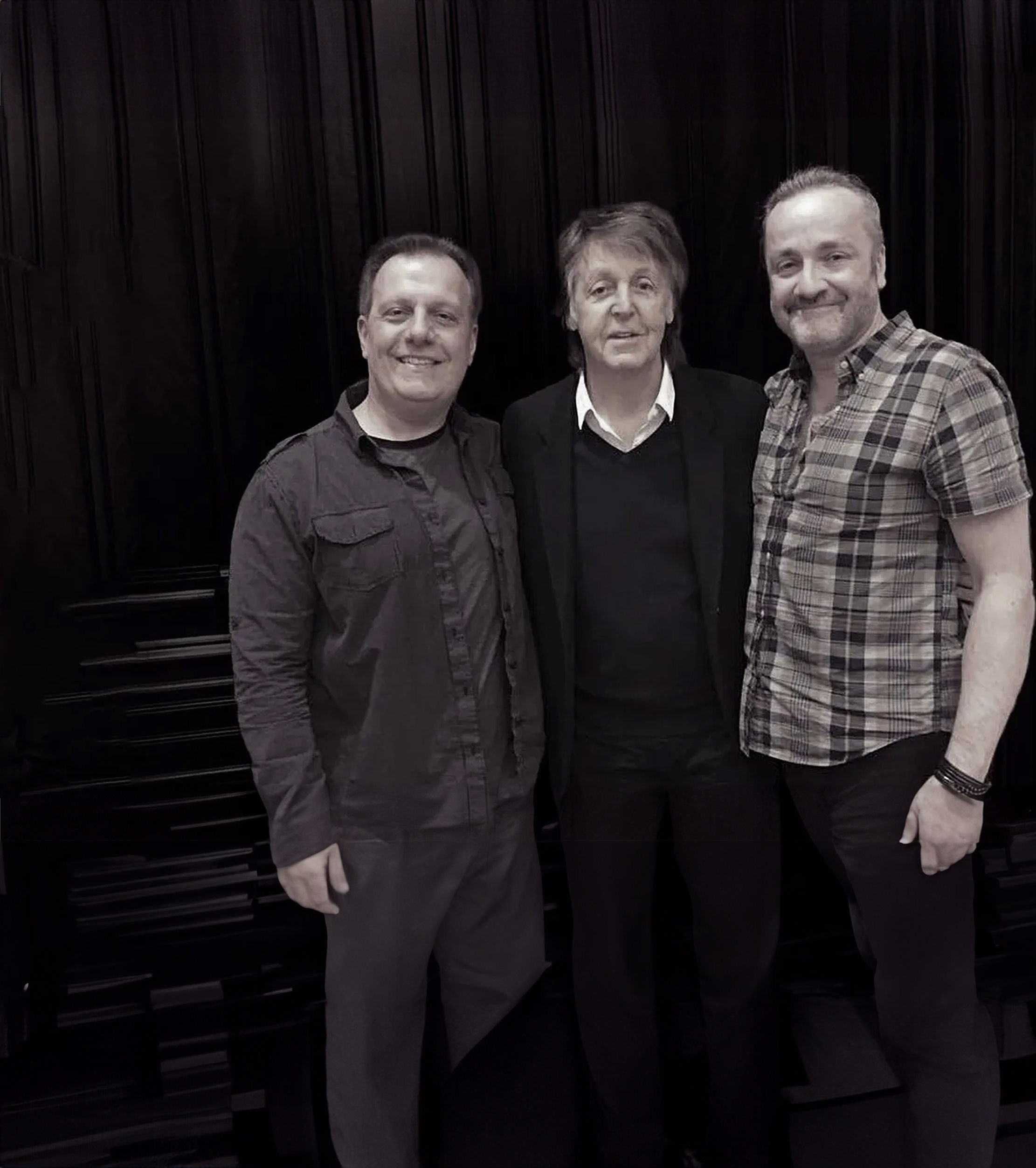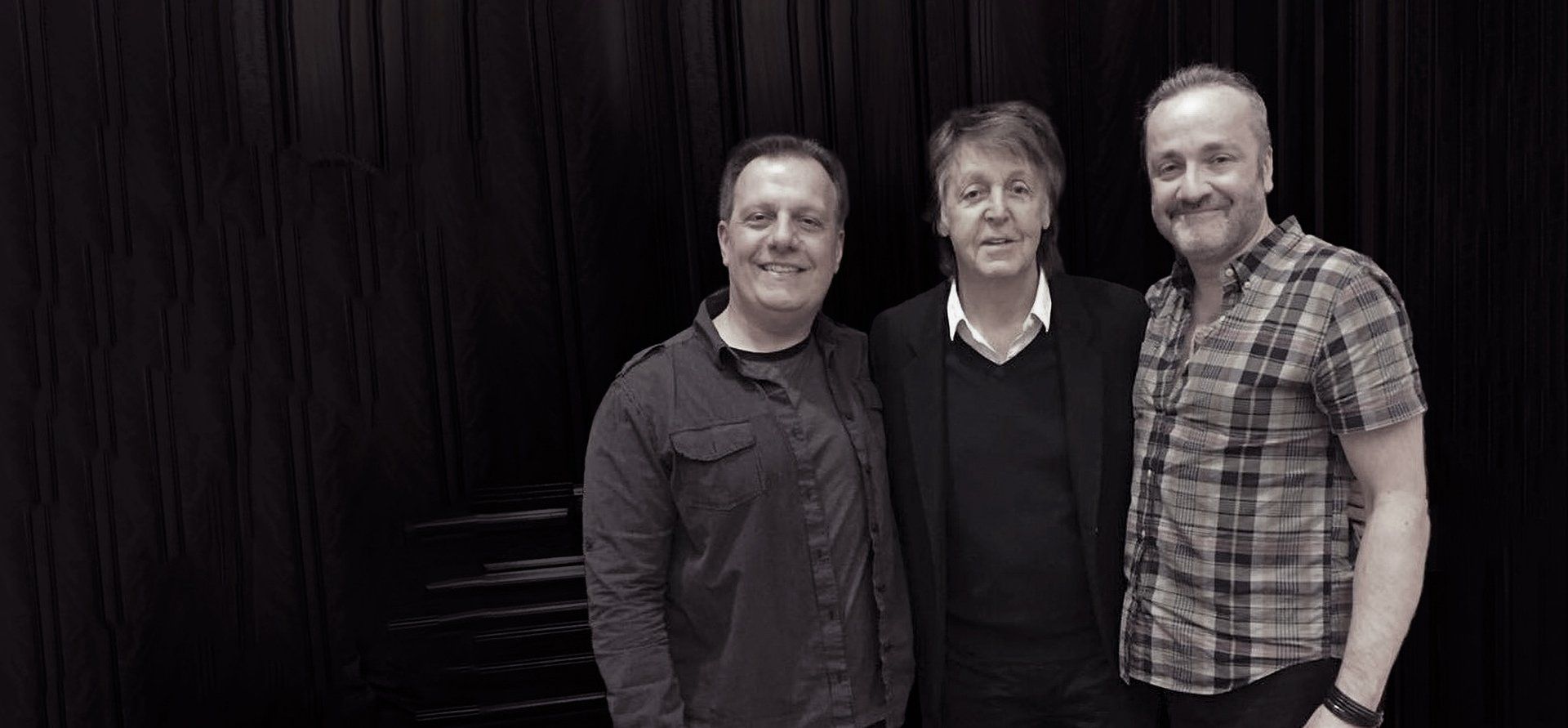

An ‘All-In’ Kind of Guy
Working with megastars from Aerosmith to Lady Gaga, most people wouldn’t match his resume in an entire lifetime.
Robert L. Smith
Robert L. Smith is a true music ‘lifer’, dedicating more than three decades to a phenomenal career producing all genres of music, not to mention scoring dozens of movie soundtracks. With 402 music credits alone to his name, working with megastars from Aerosmith to Lady Gaga, most people wouldn’t match his resume in an entire lifetime – and he’s certainly not stopping yet. He talks to us about his ‘all or nothing’ approach, his love of variety, and getting his teeth into new gear.
As a music ‘lifer’, can you really pinpoint where it all started?
It’s difficult. I have always had a real fascination with sound. I remember my grandfather gave me a little AM radio as a birthday present, and it never left my side. By the time I was 11 years old I got a cassette deck and a couple of microphones and it’s been pretty much been that since then – I’ve never really wavered from it. I did play bass in a band where I was referred to as a bass ‘owner’ as I really wasn’t that much of a bass player...! I did that for a while til I discovered that it was not my thing all, but I was always really fascinated by the equipment.
I moved to New York City from upstate New York in the 80s, when there were still studios here. I went to a fairly useless school - at a job interview when I was still in school, they said you should have just spent the money on a car! Then I worked at a lot of different facilities throughout New York, and here I am. Obviously, the industry has evolved - or devolved - in many, many ways since then. I feel sorry for the kids that write to me every day going ‘I just want to sit in’ and I say ‘well…I do a lot of mouse-clicking. You can watch that, I guess!’
I am fortunate still to do a lot of live sessions with orchestras, big bands, rock bands, you name it. All those sessions are rather chaotic in the sense that it’s never like one person singing, it’s 25 musicians, and we have 10 hours to record a whole album or a whole project or a show or a film.
You’re so incredibly busy and eclectic, with hundreds of tracks to your name, across such a broad scope. Was that a conscious decision or just how it worked out for you?
I never mapped it out, but I do love variety. I hate repeating myself and doing the same thing over and over again, so any chance I get to do something I haven’t done before, I take it. I don’t sleep a heck of a lot, I don’t eat a lot – so there’s no weight problem, and I’m always a little sleepy! But at the same time, I love doing this; the more I do it, the more I love it, so it was definitely the right move. Most guys I started with, once they got into it, they then started families and all that kind of stuff, and there’s only a couple of times you can say ‘yeah, honey, I’ll be gone for 16 hours again today…’ - that’s not going to work. So I’ve definitely been a lifer, all in. I’m not a middle guy - it’s either all or nothing for sure.
If people ask what music you like, I say just ‘good’ music!
After I stopped playing in a band, I did the DJ thing for a while in the early 80s, and that forced me to go away from my Aerosmith records to listen to all kinds of pop music. I had to kind of know what was out there, and that grew into an appreciation of many different styles. I did a session a few weeks ago where Grandmaster Flash sat in - his record was one of the first rap records I ever heard back in the early 80s. I’ve always appreciated being able to like his sort of thing then still need to rock out to AC/DC. I’m not picky that way.
There are very few exceptions where I say no. I like the challenge of being presented with a genre I don’t really know, and then really nailing it - you almost don’t believe that you were fortunate enough to capture it. When I don’t know the style, but what I make really stands up to the traditional form or sound – like Middle Eastern stuff and things like that. When you can pull that off, that’s a really good day.
You’ve had big hits with films as well as music. Are they two sides of the same coin for you? Which do you love the most?
The process for making a record and the process for making a film is incredibly different. The goal is different, so the process is different. It was amazing how I had to take my skill set and morph it into this other thing. In some sessions, you sit there, and you’re not really required to chime in at all. You’re just there to make it all run smoothly, or sometimes your opinion is asked quite often, or even stylistically what you do as an engineer can influence a sound or inspire a composer differently.
Back in the late ‘90s, an artist I worked with who was also a video editor liked what I was doing and started throwing me commercial work. It was around the time that Moby was big, and Air, a lot of that sampled loop kind of thing. I ended up getting a room in a facility on my own as a mixer/composer, and that grew into me forming a company with the video editor, with a full-blown video editing facility and a recording studio. So I stepped away from the traditional music industry thing for about six years. That’s when the film stuff started to really build. We would do a lot of high-end commercials and films and DVDs - a concert video for Lenny Kravitz, a Yeah Yeah Yeahs video, a lot of stuff for Fall Out Boy.
It just kind of went on and on. We had an accidental business plan which worked great for my studio: if you were an indie artist and I wanted to work with you, I could afford to work with you relatively cheaply because my bills and my staff were paid for Coca Cola, Adidas, Reebok, Oil of Olay, Proctor and Gamble: all these high-end commercials were paying for everything - almost like these indie artists were being subsidised by major corporations and they didn’t know it! It worked really really well.
You’ve been on quite a rollercoaster gear journey haven’t you - through the birth of MIDI, the birth of sampling, the birth of DAWs. What are the stand-out bits of gear for you, really forming the milestones on that journey?
Back in the day, I remember the Sony 3348s and the ADATs and all the DA88s and all the crazy conversions and translations you had to do to make them lock up to an analog 2” machine. There were times this machine would come in you wouldn’t know, and you’d be clutching the manual for dear life - real seat of the pants kind of thing!
Probably the most important for me was an Akai S3000 sampler. I’ve only realized recently how pivotal that was. It was at a time that I was freelancing in New York. Things were really dead around ’97, ’98. I had finished my last staff position at the Power Station in New York, I was sitting around. I’d go for a ride in the afternoon, then I’d dive into the Akai S3000 and just stay up all night and learn this thing. I sat there for approximately nine months and figured the box out, every nook and cranny of it. I’ve realized only recently that me spending that time ended up leading to all sorts of different things. I ended up making my own music – as a non-musician - samples and loops, all that sort of thing, then I brought in guest vocalists to write songs to them, then we actually made an album - never officially released, but it led to many other things. It meant I had a sound and a stamp that I became known for.
If you know what you’re doing and you deal with multiple microphones, you cannot work without Auto-Align.
How did you first hear about Sound Radix?
I think it was from Frank Filipetti raving about them. I tried Auto-Align and was just like, ‘Oh. My God.’ When Little Labs brought out their In Between Phase box, I was a big fan of that, but once I started playing with Auto-Align, it was just like something else. In a way, it’s the most boring plug-in because it’s not an ‘effect.’ It’s not like ‘wow,’ but if you know what you’re doing and you deal with multiple microphones, you cannot work without it. Especially on piano, where I do a thing with three microphones: Auto-Align just snaps it into full resolution. It’s amazing. I just finished this album with a jazz trio, really great players, and the main effect was Auto-Align. I didn’t need EQ, there was like a little bit of plate reverb on there, and that’s really it.
I’ve been playing with Drum Leveler as well. The biggest thing for me is it saves me so much time. When you have a pile of mixes to do, you don’t have time to sit there for 5 or 6 hours automating a gate or something like that. Oftentimes I get things that I haven’t recorded - who knows where it’s been recorded - it’s very rare I get something in that’s exceptionally recorded, so there’s always some kind of triage that needs to take place to make it sound like something. I just used it on a jazz album, which was another ‘ah..yes!’ moment - I started with the smooth bass preset and tweaked from there, and it was perfect, really, really nice.
After a career you can be enormously proud of, looking back, what advice would you give your 16-year-old self as to what has taken you on this journey and kept you working?
That’s a really good question. Persistence has been the thing - stick with it. If it’s really meant to be, that’s where you’re going to feel right. I always say to people that are creative who stop being creative and wonder why their life has stopped, well, they’re denying themselves the greatest joy. You need to respect that, you can’t just shut it off no matter what happens in your life - family, health issues, whatever - you have to retain some of what is important to you; you can’t just turn it off. We’ve seen what happens with people when they turn off things that are important to them, and it’s never really pretty.
When people ask ‘how did it all start,’ well, it’s never been a thing of ‘maybe one day…’ – it’s always been that day! This is who I’ve always been! If you want to do it the way I’m doing it, it’s not a job. It’s never been about the money. I don’t care about that. That’s not what I do it for. I don’t ever need a vacation: a vacation from what? I get to sleep til noon then people pay me to listen to music all day! What’s wrong with that? The last time I had a real job was in 1985!





























